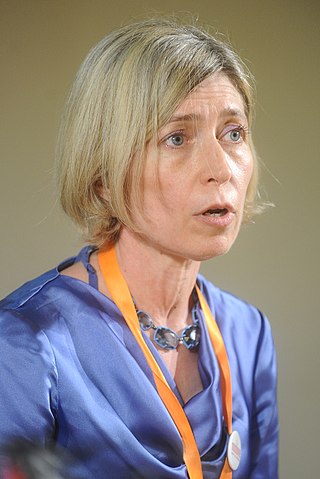Related Research Articles

Maurice Moses "Maury" Obstfeld is a professor of economics at the University of California, Berkeley and previously Chief Economist at the International Monetary Fund. He is also a nonresident senior fellow at the Peterson Institute for International Economics.

The Centre for Economic Policy Research (CEPR) is an independent, non‐partisan, pan‐European non‐profit organisation. It aims to enhance the quality of policy decisions through providing policy‐relevant research, based soundly in economic scholarship, to policymakers, the private sector, and civil society.

Stefan Nicolaas Dercon,, is a Belgian-British economist and a Professor of Economic Policy at the Blavatnik School of Government and the Department of Economics at the University of Oxford. He is also the Director of the Centre for the Study of African Economies.
Garance Genicot is a Belgian-American economist and associate professor of economics at Georgetown University. She is a member of the Core Group at Theoretical Research in Development Economics (ThReD), a research associate at the National Bureau of Economic Research (NBER) Development Economics Program, a research associate at the Center for Economic and Policy Research (CPER) in both the Political Economy Program and in the Development Economics Program, a Fellow at the Bureau for Research and Economic Analysis of Development (BREAD) and a research fellow at the IZA Institute. From 2013 to 2018, she served as an External Member of the World Bank Research Management Committee. A more detailed overview of her work can be found on RePEc., Research Papers in Economics.

Oriana Bandiera, FBA is an Italian economist and academic, specialising in development economics. She has been Professor of Economics at the London School of Economics since 2009. She is currently the Sir Anthony Atkinson Professor of Economics at the London School of Economics, and co-editor of Econometrica. Her area of study primarily concerns organizations and labor markets, and their relationship with the process of economic development.
Benjamin A. Olken is an American economist and professor at the Massachusetts Institute of Technology (MIT). Olken is one of the directors of the Abdul Latif Jameel Poverty Action Lab (J-PAL), a research centre specializing on the use of randomized evaluations for the purpose of studying poverty alleviation. His research focuses on the political economy of developing countries, especially regarding the role of corruption and the impact of interventions addressing corruption.
Christopher R. Udry is an American economist who currently serves as King Professor of Economics at Northwestern University. Udry is the co-founder and current co-director of the Global Poverty Research Lab at the Kellogg School of Management. Udry's research focuses mostly on development economics, in particular rural development in Sub-Saharan Africa, to which he owes his position as one of the world's most prominent agricultural economists.
Rema Hanna is an economist and is the Jeffrey Cheah Professor of South East Asia Studies at Harvard University's Kennedy School of Government. Moreover, she currently serves as co-director of the Evidence for Policy Design (EPoD) research programme at Harvard's Center for International Development and a scientific co-director for Southeast Asia at the Abdul Latif Jameel Poverty Action Lab (J-PAL). Her research focuses on the efficiency and effectiveness of public services in developing countries, with specific focus on service delivery and the impacts of corruption. She is also the co-chair of the editorial board for the academic journal Review of Economics and Statistics.
Ahmed Mushfiq Mobarak is a Bangladeshi economist and a professor of economics at Yale University. Moreover, he is a co-chair of the Abdul Latif Jameel Poverty Action Lab's (J-PAL) Urban Services Initiative and its Environment and Energy sector, as well as the lead academic for Bangladesh at the International Growth Centre (IGC). His research interests concentrate on environmental issues in developing countries.
Eliana La Ferrara is an Italian economist and Professor of Public Policy at Harvard University's Kennedy School of Government. Before receiving tenure at Harvard in 2022, she held the Fondazione Romeo ed Enrica Invernizzi Chair in Development Economics at Bocconi University, where she also acted as Scientific Director of the Laboratory for Effective Anti-poverty Programs (LEAP). Previously, she was also the president of the Bureau for Research and Economic Analysis of Development (BREAD) as well as the president of the European Economic Association. In terms of research, her fields of interest include development economics, political economy, and public economics.
Nathan Nunn is an economist and Professor in the Vancouver School of Economics at the University of British Columbia. He is best known for his research on the long-term effects of slave trade on Africa. His research interests include economic development, cultural economics, political economy and international trade.
Mark Richard Rosenzweig is an economist and the Frank Altschul Professor of International Economics at Yale University, where he also directs the Economic Growth Center. Rosenzweig belongs to the world's most prominent agricultural and development economists, and is one of the leading scholars on the subjects of the economics of insurance and migration.
Uwe Sunde is a German economist and currently Professor of Economics at the Ludwig Maximilian University of Munich (LMU) as well as a Research Professor in the ifo Center for Labour and Demographic Economics. Sunde's research interests include long-term development and growth, political economy, labour economics, population economics, and behavioural economics. In 2015, his research on risk preferences and on the role of life expectancy and human capital for long-term economic development earned him the Gossen Prize.

Pierre Cahuc is a French economist who currently works as Professor of Economics at Sciences Po. He is Program Director for the IZA Institute of Labor Economics's programme "Labour Markets" and research fellow at CEPR. His research focuses mainly on labour economics and its relationship with macroeconomics. In 2001, he was awarded the Prize of the Best Young Economist of France for his contributions to economic research. He belongs to the most highly cited economists in France and Europe's leading labour economists.
Camille Landais is a French economist who currently works as Professor of economics at the London School of Economics. His research focuses on public finance and labour economics. In 2016, Landais was awarded the Prize of Best Young Economist of France for his research on the relationship between changes in inequality and fiscal and social policy.
Edwin Leuven is a Dutch economist and Professor of Economics at the University of Oslo. He is one of the leading European education economists, with a focus on the economics of training.
Siwan Anderson is a Canadian economist and professor at the Vancouver School of Economics (VSE) at the University of British Columbia (UBC). Her area of focus is on development economics with a micro-level approach focusing on institutions in developing countries, and also gender economics focusing on the role of women in the economy. Siwan Anderson is also an Associate of the Canadian Institute for Advanced Research (CIFAR), an Associate of the Theoretical Research in Development Economics (ThReD), a Fellow of the Bureau for Research and Economic Analysis of Development (BREAD), and a Faculty Associate of the Center for Effective Global Action (CEGA). Siwan Anderson is the first woman to receive the John Rae Prize from the Canadian Economics Association.
Christopher Woodruff is an American economist and Professor of Development Economics at Oxford University.
Dina Deborah Pomeranz is a Swiss economist and assistant professor of applied economics at University of Zurich. Pomeranz is considered to be one of the most influential Swiss economists.
Graziella Bertocchi is an Italian economist and Professor of Economics at the University of Modena and Reggio Emilia in Modena, Italy. She is known for her work connecting economic growth within a historical perspective.
References
- ↑ Homepage of Marcel Fafchamps on the website of Stanford University. Retrieved June 28th, 2019.
- ↑ Marcel Fafchamps is ranked 28th among 1821 economists registered on IDEAS/RePEc for the field of development.
- ↑ Curriculum vitae of Marcel Fafchamps on the website of Stanford University. Retrieved June 28th, 2019.
- ↑ Profile of Marcel Fafchamps at J-PAL. Retrieved June 28th, 2019.
- ↑ Marcel Fafchamps is a Research Fellow at IZA. Retrieved June 28th, 2019.
- ↑ Profile of Marcel Fafchamps at CEPR. Retrieved June 28th, 2019.
- ↑ Profile of Marcel Fafchamps at CEGA. Retrieved June 28th, 2019.
- ↑ Marcel Fafchamps is a member of BREAD's Board of Directors. Retrieved June 28th, 2019.
- ↑ Editorial Board of 'Economic Development and Cultural Change'. Retrieved June 28th, 2019.
- ↑ Profile of Marcel Fafchamps at J-PAL. Retrieved June 28th, 2019.
- ↑ Marcel Fafchamps is ranked 327th among 57161 economists registered on IDEAS/RePEc. Retrieved June 28th, 2019.
- ↑ Google Scholar page of Marcel Fafchamps